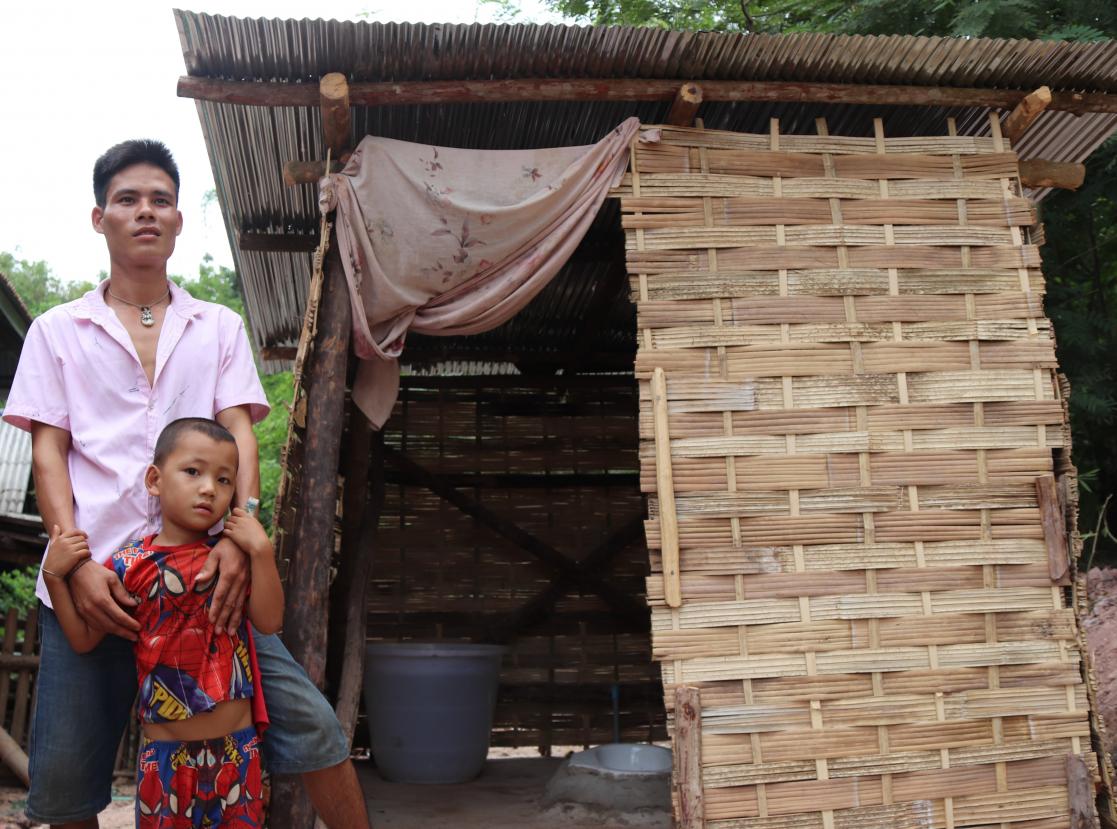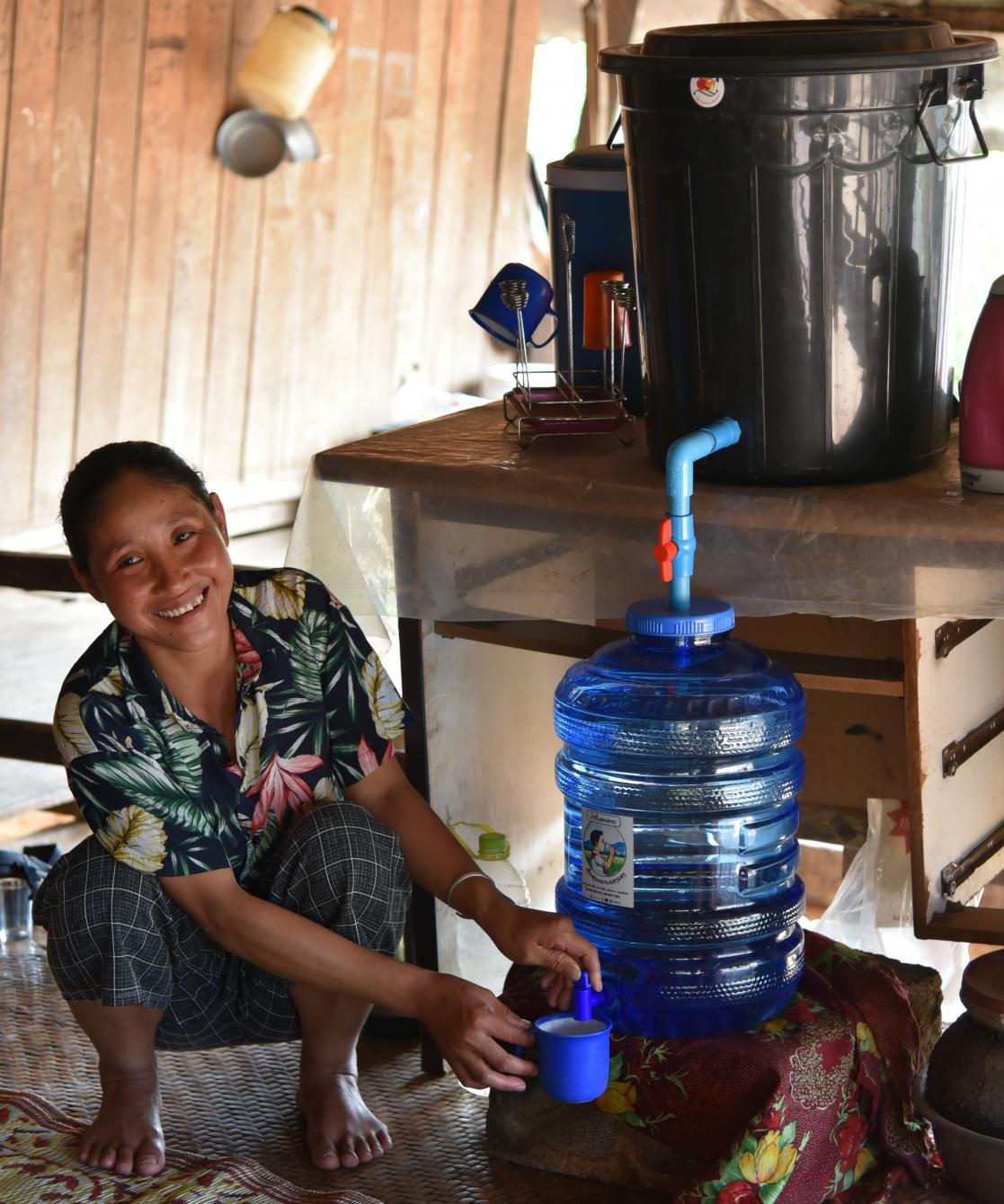Improved economic access and use WASH products in the target villages under SCALING Project
Background:
Lack of access to Water Sanitation and Hygiene (WASH) has both direct (e.g. diarrheal diseases, intestinal parasite infections and environmental enteropathy) and indirect (e.g. necessitating walking long distances in search of water and sanitation facilities and diverting a mother’s time away from child care) impact on a child’s nutritional status. These effects are recognized in the NNS and the NNSAP 2016-2025.
SCALING aims to improve the capacity of Nam Saat (water supply) as the department responsible for the supply of clean water in villages under the Ministry of Health, in two areas: improvement of sustainable water supply systems in selected villages and the marketing of selected WASH products. Under the WASH Marketing component households in the target areas are encouraged to invest in latrines and water filters in cooperation with selected private vendors and trained Community Sales Agents. The approach matches the government policy to implement its Community-Led Total Sanitation (CLTS) approach and to make all villages Open Defecation Free (ODF) by 2023. In addition to the approach on marketing of selected WASH products the project has allocated budget for water system constructions in the target communities.
Objectives:
Improve Nam Saat capacity in two areas: WASH infrastructure and WASH marketing with the specific objectives:
- To train private sector actors, entrepreneurs/ small shop owners to market WASH products
- To Construct/rehabilitate water systems
- To support and encourage the local community households to invest in latrines and water filters in cooperation with selected private vendors and trained Community Sales Agents for a reasonable cost
Results:
- 28 Nam Saat staff are trained (both district and province levels) to conduct market assessments, produce a marketing strategy, train entrepreneurs in sustainable WASH value chains. Database for monitoring of water systems developed and effective, as well as conducting both technical and social approaches to water system installation
- 140 private sector actors trained to market WASH products, and WASH products marketed and available for sale in SCALING project locations
- 140 villages have a new or upgraded water system and water committee members are trained: improved access to and use safe drinking water 1000 Day households in 420 villages benefit from discounts on WASH products.
Facts and Figures:
- 48 Nam Saat staff trained on WASH product marketing and infrastructure
- 16 new private vendors trained to market WASH products
- 646 community sale agents trained
- 16 water systems constructed/rehabilitated
- 1,125 new households which have constructed a latrine and
- 674 households which procured a Water Filter as a result of marketing for WASH products.
Testimonies:

Case Study Mr. Sorh Korh invests in WASH products (latrine)
“Before the SCALING project came to the village, there were a few families without a latrine. Sorh Korh’s family was one of those. Sorh Korh and his family used to go to the nearby forest when they wanted to use the toilet. It was difficult especially when it was raining or sunny because they could not hide from the rain or the sun. They sometimes got bitten by mosquitos or insects in the forest. Sometimes, they had to go to a cousin’s house to use the toilet when it was raining.
When the project came, families without latrines were encouraged to build one. Sorh Korh has realised his latrine since about two weeks. When asked about the impact of the latrine, Sorh Korh answered: “very good”. He described his situation before having the latrine as “I used to go to nearby forest or someone else’s toilet when I needed to use toilet…I sometimes got bitten by mosquitos in the forest”. He also said “after having the latrine, I do not have to worry about the rain when it is raining and I do not have to worry about sun when it is sunny…I do not get bitten by mosquitos or insects”. He added that “one of the most significant impacts of having this latrine is I do not have to visit my cousin’s place to use their toilet if it rains.”

Case Study Ms. Arsorh invests in WASH products (water filter)
Arsorh is from the Akha ethnic minority group and lives in Lor Meu village, Sing district, Luang Namtha, with her husband and four children (1 son and 3 daughters). Arsorh and her husband are farmers and spend most of their time working in their upland paddy fields and rubber plantations during cropping and harvest seasons. At home Arsorh also has to do household chores. For instance, fetching water, washing, collecting firewood for cooking food and boiling water for drinking. A few months ago district health staff together with a CARE project officer came to the village to introduce WASH products to the villagers. As a result, her family decided to buy a water filter which costs around LAK 250,000 per set.
“Since my family has owned this water filter we have enough safe drinking water at home and we do not waste much time boiling water with firewood. It is much cheaper if compared with buying bottled water from the shops.”
Partners: Ministry of Health (MOH), Provincial Health Office (PHO), District Health Office (DHO), Save the Children International (SCI), CARE, ChildFund (CFL) and Comité de Coopération avec le Laos (CCL)

